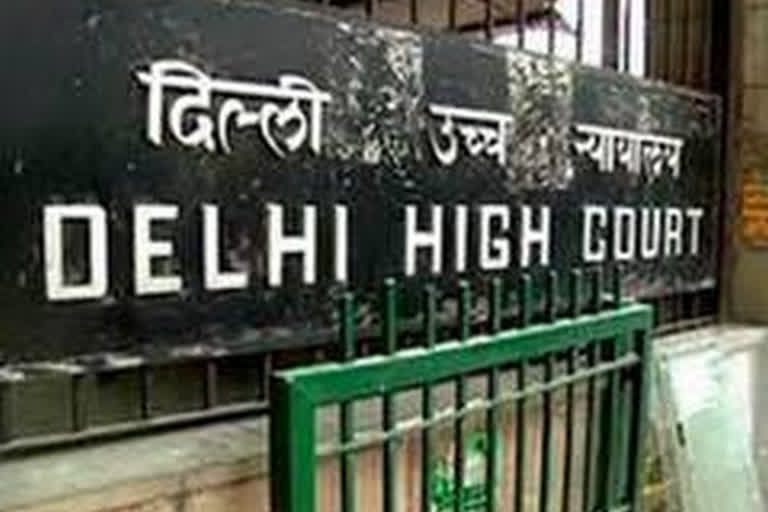New Delhi: The Centre on Thursday told the Delhi High Court that it was committed to protecting "the liberty, dignity, and rights of every woman who is the fundamental foundation and pillar of a civilised society" and a meaningful consultative process with various stakeholders and state governments is needed on the pleas seeking criminalisation of marital rape.
It said that the issue of whether to criminalise marital rape has very far-reaching socio-legal implications in the country and any assistance by the government can be meaningful only after consultative process with the participation of all stakeholders.
Urging to defer the hearing on a batch of pleas to criminalise marital rape, the Centre, in an additional affidavit filed before a bench of Justices Rajiv Shakdher and C Hari Shankar, undertook to provide a time-bound schedule within which it will carry out such consultative process on the issue and render effective assistance in the proceedings.
The court, which is conducting the marathon proceedings on a daily basis, will now hear the matter on Friday.
Both the executive and the legislature are equally concerned and committed to the protection of fundamental rights of its citizens. However, it is the considered opinion of the Central Government that this court can be assisted only after a consultative process is undertaken by the Central government with all stakeholders including all the state governments, the Centre, in its affidavit filed through advocate Monika Arora, said.
Considering the social impact involved, the intimate family relations being the subject matter and this court not having the privilege of having been fully familiarised with ground realities prevailing different parts of society of this large, populous and diverse country, taking a decision merely based upon the arguments of few lawyers may not serve the ends of justice, it said.
It said the affidavit is in continuation of oral requests made on behalf of the Centre at various stages of hearings in January to defer the hearing in the case.
The government of India is committed to fully and meaningfully protect the liberty, dignity, and rights of every woman who is the fundamental foundation and a pillar of a civilized society.
At the same time, the question involved in the petition may not be treated merely as a question concerning the constitutional validity of a statutory provision as the subject matter has and will have very far-reaching socio-legal implications in the country. The matter, therefore, needs a comprehensive approach rather than a strictly legal approach, the affidavit said.
Also Read: Criminalising marital rape will not desecrate institution of marriage: Delhi HC told
It said state governments and other stakeholders, barring a few affected parties and the Central government, are not before the court.
It said the first petition was filed in 2015 and the provisions whose validity is challenged is in existence since inception and it was only because one of the petitioners suddenly mentioned the matter for final hearing during the pandemic, that the hearing has commenced leaving no time for the Centre to deliberate upon the issues and implications involved with all the stakeholders as the exercise takes a reasonable time.
It added that the absence of any such consultative process by the executive or legislature may result in some injustice to one section or the other.
The Centre reiterated its request to defer the hearing and added that if the matter which is pending since 2015 awaits such fruitful exercise for some time, no prejudice would be caused and it will be possible for the government to assist the court meaningfully.
It would be possible for the court to take a holistic view rather than deciding such a sensitive issue as a mere legal question based upon the submissions of a few lawyers, it said.
The deponent, therefore, reiterates that the hearing be deferred providing for a stipulated timeline within which the Central government would conduct an effective consultative process after which it will be in a position to assist this court, the affidavit, filed by Prakash, Joint Secretary in Ministry of Home Affairs, said.
The bench is hearing a batch of petitions to strike down the exemption from prosecution for the offence of rape granted to husbands under the Indian Penal Code.
In its 2017 affidavit, the Centre had opposed the pleas submitting that marital rape cannot be made a criminal offence as it could become a phenomenon that may destabilise the institution of marriage and an easy tool for harassing husbands.
However, the Centre recently told the court that it was re-looking at its earlier stand on the petitions as that was brought on record in the affidavit filed several years ago.
The court had said that the central government needs to make up its mind concerning its position on the issue.
Last week, the court had asked the Centre to inform whether it wished to withdraw its earlier affidavit filed in the matter in view of its latest stand that it was undertaking a consultative process on the issue.
It was hearing PILs filed by NGOs RIT Foundation, All India Democratic Women's Association, represented through advocate Raghav Awasthi, a man, and a woman seeking striking down of the exception granted to husbands under the Indian rape law.
The petitioners have challenged the Constitutionality of the marital rape exception under Section 375 IPC (rape) on the ground that it discriminated against married women who are sexually assaulted by their husbands.
PTI



